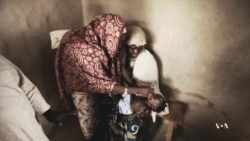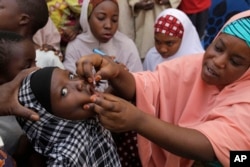In mid-August, Nigeria was set to celebrate being polio-free for two years. In one more year, the World Health Organization would declare the country polio-free.
But that didn’t happen. Instead, two children in different parts of Borno state caught the virus and were left paralyzed.
Conflict in that northern state has made getting all children there immunized dangerous. The geography can also make it difficult to get to them.
As a result, hundreds of thousands of children may have missed getting vaccinated, allowing the virus to circulate quietly for the past five years. The two latest cases of polio are similar to the strain that spread in 2011.
Not everyone who gets polio suffers from paralysis. Polio cripples only about one out of every 200 people who get it. That means that if two children were paralyzed, up to 400 could have had the virus.
In a Skype interview, John Vertefueille, who heads the polio eradication effort at the U.S. Centers for Disease Control and Prevention in Atlanta, said that while the new cases were a disappointment to all those working to eradicate polio in Nigeria, timelines are built into the eradication process to give polio workers and the health ministry a chance to review the process and make sure nothing was missed.
Vertefueille said this could mean active case finding. It could mean looking very critically at the surveillance and finding out where immunization campaigns need to be strengthened.
Vaccinations begin
The Nigerian government has already started vaccinating children in Borno. Nigeria's health minister, Isaac Adewole, issued a statement saying more than 31.5 million children were targeted to be vaccinated with oral polio vaccines in the North East, North West and North Central zones of the country. Another 56 million children will be vaccinated between in October and November of this year.
Children in neighboring countries will also have to be vaccinated. In an interview on VOA, Bill Gates, the founder of Microsoft, said he was optimistic that Nigeria can beat polio. The Bill and Melinda Gates Foundation, the charity started by the computer technology magnate and his wife, is a major player in the effort to eradicate polio, along with the CDC, UNICEF, the WHO and Rotary International.
As long as there are unvaccinated children anywhere in the world, polio can survive and spread. The stakes are high.
The WHO reports that polio cases have decreased by over 99 percent since 1988, when the global eradication campaign began in earnest. The polio virus is circulating in only two other countries, Afghanistan and Pakistan. The WHO says failure to eradicate polio from these last remaining strongholds could result in as many as 200 000 new cases every year, and within 10 years, it could spread all over the world.
Despite the setback, Nigeria has made great strides in immunizing its children. Now it only has to get to the finish line.












